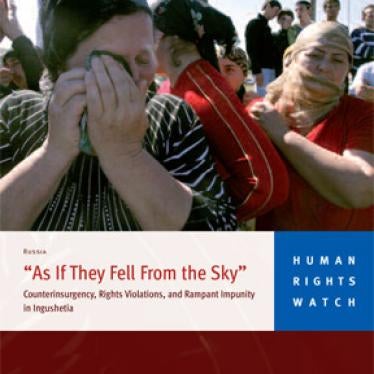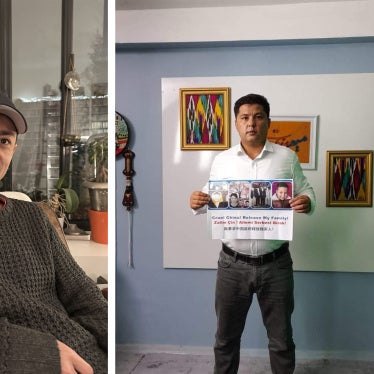The Chechnya armed conflict has spread human rights abuses and instability across the North Caucasus, and particularly in Ingushetia, Human Rights Watch said in a report released today. Human Rights Watch urged the Russian government to amend its counterinsurgency techniques and address impunity for violations in Ingushetia to ensure that the situation does not descend to the appalling abuses that characterized the conflict in Chechnya.
The 120-page report, “‘As If They Fell From the Sky!’ Counterinsurgency, Rights Violations, and Rampant Impunity in Ingushetia,” documents human rights abuses committed by law enforcement and security forces involved in counterinsurgency, including dozens of summary and arbitrary detentions, acts of torture and cruel, inhuman or degrading treatment, enforced disappearances, and extrajudicial executions. The report covers action taken during 2007 and early 2008, and describes the legal and political contexts in which they have occurred.
“The crimes in Ingushetia, although on a far smaller scale, evoke the thousands of enforced disappearances, killings, and torture cases that plagued Chechnya for more than a decade,” said Tanya Lokshina, Russia researcher at Human Rights Watch. “Russia’s brutal counterinsurgency policies are antagonizing local residents. Far from ending the insurgency, ‘dirty war’ tactics are likely to further destabilize the situation in Ingushetia and beyond in the North Caucasus.”
In the last few years in Ingushetia, Russia has been fighting several militant groups with a loose agenda to unseat the Ingush government, evict federal security and military forces based in the region, and promote Islamic rule in the North Caucasus. Beginning in summer 2007, insurgent attacks on public officials, law enforcement and security personnel, and civilians rose sharply. Against this background of increasing insurgent activity, law enforcement and security forces are carrying out abduction-style detentions of those suspected of insurgency; those abducted are regularly tortured, and sometimes “disappear.” Abduction-style detentions and killings in Ingushetia often happen during “special operations,” which resemble the pattern of abusive sweep operations and targeted raids seen in earlier years in Chechnya. Groups of armed personnel arrive in a given area, often wearing masks. They do not provide the residents with any explanation for the operation, force entry into homes, beat some of the residents, and damage their property.
Particularly disturbing are the frequent extrajudicial executions. The Human Rights Watch report documents eight such cases. The youngest victim, six-year-old Rakhim Amriev, was killed in a raid on his parents’ home, where security forces believed an alleged insurgent was hiding. An investigation into his death is ongoing. That investigation is exceptional, however, and can be explained only by Amriev’s young age, which precluded the authorities from alleging his involvement in insurgency. In the majority of extrajudicial executions, insurgency-related charges are filed against the victims posthumously, and their killings are never investigated.
Security and police personnel responsible for human rights violations in Ingushetia are not held to account. Distressed by absolute impunity for the perpetrators, and the authorities’ repeated claims that the situation in the region is normal, local residents organized several protest rallies in 2007 and early 2008. The Ingush authorities, however, call those rallies “a provocation” playing into the hand of the insurgents. They have done their utmost to prevent protests, including by banning and violently dispersing planned events and attempting to silence media coverage.
In a striking move to intimidate independent observers, 16 visiting and local human rights advocates and journalists were variously threatened, abducted, beaten, detained, and expelled from Ingushetia by security forces as they attempted to monitor two planned public rallies in November 2007 and January 2008.
“If Russia wants to stop Ingushetia from becoming a full-blown human rights crisis, which has characterized Chechnya, it must put an end to these violations,” said Lokshina. “The Russian and Ingush authorities should investigate these crimes and prosecute those responsible, regardless of their rank. Abusing civilians won’t help in the fight against terrorists – it actually makes the conflict worse.”
Human Rights Watch called on the Russian government to immediately stop the practice of extrajudicial executions, enforced disappearances, abduction-style detentions, and other abuses perpetrated in Ingushetia. Human Rights Watch also said the Russian government should ensure meaningful accountability mechanisms to bring perpetrators of serious violations to justice and end disproportionate restrictions on freedom of assembly and expression in Ingushetia.
Russia’s international partners, particularly in Europe, should urge Russia to stop rights abuses in Ingushetia, Human Rights Watch said. They should also ensure Russia implements in full the rulings handed down by the European Court of Human Rights regarding violations in Chechnya; not only do the rulings bring some justice to victims, but they are an instrumental step for preventing such violations from being perpetrated in Ingushetia and more widely in the North Caucasus.







